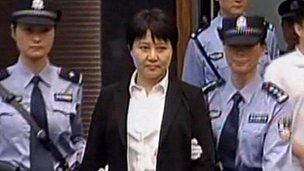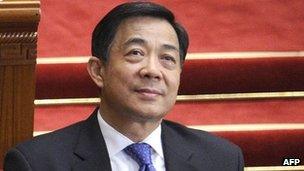Profile: Gu Kailai
- Published

Ms Gu is the wife of populist Chongqing party leader Bo Xilai
Gu Kailai was once half of one of China's most high-flying couples.
Married to populist Chongqing party leader Bo Xilai, the former lawyer enjoyed the influence that accompanied his top-level role in the all-powerful Communist Party.
But as China prepared for its 10-yearly leadership transition, the couple plummeted from grace in a scandal that rocked the political elite.
Ms Gu was tried for the murder of British businessman Neil Heywood - a crime she committed, according to state media, because of a conflict over economic interests.
The charismatic Mr Bo has been sacked and his fate remains unclear. He has not been seen in public since the formal investigation into his wife was announced.
At her one-day trial on 9 August, neither Ms Gu nor her aide Zhang Xiaojun, with whom she was accused of carrying out the murder, contested the charges.
In a closing statement, Ms Gu said the case had been "a huge stone weighing on me for more than half a year," the state news agency Xinhua reported., external
She blamed her actions on a "mental breakdown", saying she would "accept and calmly face any sentence".
On 20 August she was given a suspended death sentence and sent to prison.
Legal career
Before her demise, Ms Gu had a reputation as a charming and intelligent woman, always elegantly dressed and fluent in English.
Like her husband, she hails from a distinguished background - she is the youngest child of General Gu Jingsheng, a prominent revolutionary.
After the Communist Party took power in 1949, he held government positions, but like many others was imprisoned during the Cultural Revolution.
She, too, was not spared and was forced to work in a butcher's shop before resuming her education once the political turmoil eased.
She met Mr Bo in 1984 in Liaoning province and the couple have one son, 24-year-old Bo Guagua, who is thought to be in the US.
After studying at the prestigious Peking University, she qualified as a lawyer in 1988 and opened her own law firm in Beijing.
She also has a masters degree in international politics and is the author of a book on fighting a legal action in the US, after representing several Chinese companies in a high-profile case there.
But she closed her law firm in 2007 when Mr Bo became the Communist Party chief in Chongqing - an action he said was to avoid the impression she was benefiting from his position.
'No mucking about'

Bo Xilai, who is married to Gu Kailai, had been tipped for the top in Chinese politics
When the murder charge was announced, Chinese state media said she had been in dispute with Mr Heywood over "economic interests" and that, worried by "Neil Heywood's threat to her son's personal security", she and Mr Zhang poisoned him.
Both the scope of these alleged economic interests and Mr Heywood's role in them remains unclear, but multiple reports suggest he may have acted as some kind of financial middleman.
Also unclear is the relationship between Ms Gu and French architect Patrick Devillers, who China asked Cambodia to detain earlier this year. He travelled to China before the trial, reportedly to act as a witness.
Comments from those who have met Ms Gu paint a mixed picture.
A US lawyer who worked with her described her as charismatic and funny, but a British businessman who had dealings with her said she had a ''ruthless streak''.
''She said to me: 'You cross me - never come to China, you'll never get out of jail'. There was no mucking about," said Giles Hall, who told the Associated Press news agency that he refused a request from Ms Gu to charge her an inflated price for a helium balloon part so the surplus could cover her son's school fees.
Leadership link?
Western media were not allowed into the court where Ms Gu went on trial. The only accounts of what happened are from the official Chinese media and eyewitnesses.
According to Xinhua, Ms Gu admitted in court to the "intentional homicide" of Mr Heywood, saying she had suffered a mental breakdown, after learning that her son was in danger.
Prosecutors said she had invited him to visit her in Chongqing, got him drunk, and then - when he asked for water - gave him poison, handed to her by Mr Zhang.
Xinhua said evidence presented in court said she had been taking a range of drugs to treat chronic insomnia, anxiety, depression and paranoia.
She had "developed a certain degree of physical and psychological dependence on sedative hypnotic drugs, which resulted in mental disorders", Xinhua reported.
The court spared her from execution, but she now begins a long jail term.
Despite the unusually detailed report from Xinhua of the case against Ms Gu, some observers continue to ask whether the downfall of her and her husband is actually more about politics, and manoeuvring for China's top posts.